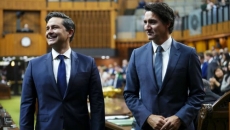Chilly nights and snow-covered slopes may not be easy to come by in much of Canada during the first part of the winter season, according to the winter outlook from one of Canada's prominent forecasters.
The Weather Network predicts El Niño conditions will lead to above-average temperatures and lower-than-normal precipitation levels in much of the country, particularly in Western and Central Canada.
While that trend is expected to hold throughout the winter in British Columbia and the Prairie provinces, the network said areas further east may see more variable conditions as the season progresses.
"It's an El Niño unlike anything we've quite seen before. And that means there could be a few surprises in store this year for Canadians," said Chris Scott, chief meteorologist at The Weather Network.
"Yes, El Niño means mild, but we're going to have to watch for a change midwinter that could lead us down a different road than we've been down before.”
The forecaster said El Niño is associated with warmer-than-normal ocean temperatures in the tropical region of the Pacific Ocean to the west of South America, which affects the global jet stream pattern.
British Columbia is expected to have a milder and drier than normal winter for much of the season, The Weather Network said in a press release, though there could be a few periods of excessive rainfall.
The Prairie provinces, especially Alberta and Saskatchewan, should also expect a milder winter, with below-normal snowfall across western and central parts of the region. Scott noted that Edmonton has so far seen no snow in November – something that last happened almost 100 years ago.
For Western Canada, "this is the winter that you'd worry more than normal about having a brown Christmas," he said.
But more traditional winter conditions could return to the Prairies for January and February, Scott said, especially in Manitoba.
The network anticipates a similar story to play out in Ontario and Quebec, where residents are slated to enjoy warmer temperatures and less snow than normal before things could take a turn for the colder.
El Niño tends to have its biggest influence on Western Canada because it’s a Pacific Ocean phenomenon, Scott explained. By the time the jet stream makes its way to southern Ontario and Quebec, it either continues east or travels south instead.
"While yes, part of this winter looks quite mild, we're very interested in what happens in the midwinter period because this forecast really takes a fork in the road," said Scott. "It either goes pretty mild for Ontario and Quebec, or it actually goes cold and we get some real winter to come."
The result, Scott predicted, is that temperatures in cities like Toronto and Montreal will likely average out to be near seasonal norms.
The forecast for Atlantic Canada, meanwhile, suggests the region is in for a near-normal winter with periods of mild weather offset by colder stretches. Precipitation, too, will be near normal, expect for the southern Maritimes and the southeastern tip of Newfoundland, which could see above-normal levels.
"Even though this is an El Niño like we've never seen before, it doesn't mean that we're suddenly going to go mild in Atlantic Canada,” said Scott.
The network predicts Northern Canada should see a slightly milder winter this year, though colder weather may come to Yukon at the beginning of the season and northern Hudson Bay and Baffin Island could see a period of colder-than-normal temperatures deeper into the winter.






